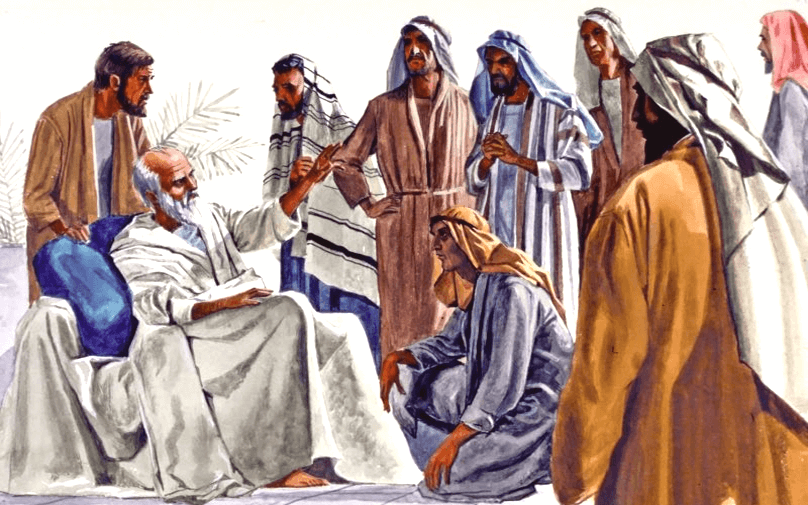Bed or Staff? (Genesis 47:31)
Asher Chee |
Genesis 47:31 ESV And he said, “Swear to me”; and he swore to him. Then Israel bowed himself upon the head of his bed.
Hebrews 11:21 ESV By faith Jacob, when dying, blessed each of the sons of Joseph, bowing in worship over the head of his staff.
Genesis 47:31 says that Israel/Jacob bowed himself on the head of his bed, but Hebrews 11:21 says that he bowed on the head of his staff. So which is it?
In order to understand what is going on here, we need to understand the importance of vowels in the Hebrew language.
The Importance of Vowels
Vowels are important in Hebrew because the meaning of a Hebrew word depends on how one vocalizes the word—that is, what vowels one reads the word with.
Consider the following Hebrew word:
מטה
What does this word mean? Well, it depends on how one vocalizes it. It could be vocalized as miṭṭāh, meaning “bed”, or it could be vocalized as maṭṭeh, meaning “staff”. As one can imagine, this certainly opens the door to some ambiguity in the Hebrew text of the Jewish Scriptures!
In Genesis 47:31, the Hebrew word for “bed” (ESV) is spelt as מטה. As we have seen, מטה could mean either “bed” or “staff”, depending on how it was vocalized.
However, during the time when the Jewish Scriptures (the “Old Testament” books) were being written, vowels were not indicated in Hebrew writing. Rather, only consonants were written, and readers were expected to determine, from context and other factors, what vowels a word should be read with. Hence, it is not clear whether the original writer of the Book of Genesis intended for the word to be vocalized as miṭṭāh, “bed” or maṭṭeh, “staff”.
The Witness of the Masoretic Text
It was only much later in history that methods were devised to indicate in Hebrew writing what vowels a word should be read with.
Beginning in the seventh century CE, a group of Jewish scribes known as the Masoretes produced a Hebrew text of the Jewish Scriptures known as the Masoretic Text. Today, the Masoretic Text is used by many Christians as the authoritative Hebrew text of the Jewish Scriptures. Most modern Protestant Christian translations of the Old Testament are based primarily on the Masoretic Text. In the Masoretic Text, the Masoretes used a system of marks to indicate what vowels the words of the Jewish Scriptures should be read with, and therefore what those words meant.
According to the Masoretic Text, the word מטה in Genesis 47:31 should be vocalized as miṭṭāh, meaning “bed”. Accordingly, most English translations, following the vocalization in the Masoretic Text, render מטה in Genesis 47:31 as “bed”.
The Witness of the Septuagint
However, this was not a unanimous view among the Ancient Jews. We find another view represented in the Septuagint. The Septuagint is a body of Greek translations of the Jewish Scriptures produced by Jews in the third to second centuries BCE. The Septuagint is very important because it gives us insights on how Jews understood the text of the Jewish Scriptures during that time—hundreds of years before the Masoretic Text was produced.
In the Septuagint of Genesis 47:31, we read:
εἶπεν δέ ὄμοσόν μοι καὶ ὤμοσεν αὐτῷ καὶ προσεκύνησεν Ισραηλ ἐπὶ τὸ ἄκρον τῆς ῥάβδου αὐτοῦ.
And he said: Swear to me! And he swore to him. And Israel bowed on the tip of his staff.
The Septuagint translators rendered the word מטה in Genesis 47:31 with the Greek noun rhabdos (ῥάβδος), meaning “staff”. This means that they had vocalized the word מטה there as maṭṭeh, meaning “staff”.
The Witness of the New Testament
So, which reading is correct? Should the word מטה in Genesis 47:31 be vocalized as miṭṭāh, meaning “bed” or maṭṭeh, meaning “staff”? For Christians, this dilemma is resolved by the New Testament Scriptures. Hebrews 11:21 says,
By faith Jacob, when dying, blessed each of the sons of Joseph, bowing in worship over the head of his staff. (ESV)
This passage refers to Genesis 47:31. From this, it is clear that the writer of Hebrews thought that the word מטה in Genesis 47:31 should be vocalized as maṭṭeh, meaning “staff”.
Conclusion
There are many places where Masoretic Text is mistaken, and does not correctly represent the original Hebrew text of the Jewish Scriptures. Therefore, it is needful to consider other points of evidence—especially the witness of the New Testament Scriptures.

